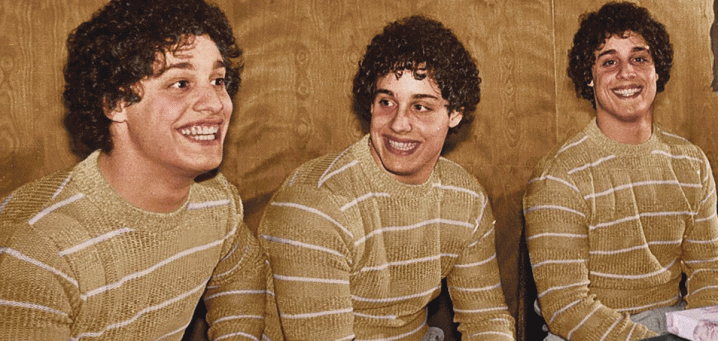SMALL SCREEN
This Weekend We’re Watching: nature versus nurture

As we’ve learnt first-hand over the last few months, sometimes real life is stranger than fiction. Three Identical Strangers is another of those times, delightful on the surface but dark and shocking just below.
What made us into who we are? That may sound like a question for philosophers, but it’s also one of the most important and complicated questions in science.
A person’s life is affected by so many factors that it is very difficult to link cause and effect – there are just too many variables. Through the annals of scientific history, the search for controls in the study of humans has led time and time again to the same solution: twin studies.
In 1875, a Victorian scientist (a half cousin of the renowned Charles Darwin) published a paper on the heritability of traits titled The History of Twins in which he argued the merits of using twins to compare the relative effects of “nature versus nurture”, a term which he coined.
That scientist’s name was Francis Galton, the father of eugenics. Galton’s findings led him to believe that human intelligence was largely determined by genetics and that selective breeding could produce a new “highly gifted race of men”.
Since Galton’s studies, the battle for our lives between nature and nurture has captured the minds of the scientific community. It is estimated that nearly 200,000 traits have been tested for in twin studies. From within the shadows, in the cases when curiosity has overwhelmed humanity, twins have been subjected to all manner of terrible experiments. Three Identical Strangers is definitely one of those cases…
Imagine stumbling upon buried pirate treasure in the backyard, or finding out that your grandpa is secretly a crime-fighting vigilante karate master. Imagine the extent of your elation and incredulity – you know it’s theoretically possible but surely this can’t actually be happening. It’s fun to hypothesise and joke about these kinds of coincidental legends, but when you actually put yourself in the shoes of someone who it’s happening to, and hear their first-hand account, you begin to grasp the shock and world-shattering confusion involved.
Three Identical Strangers is a true fairytale; the almost-unbelievable story of identical triplets, raised apart, who discovered one another’s existence at the age of 19. The suspense during the retelling of their first contact is palpable. There’s a lot of stuttering, stammering and wide-eyed disbelief. The first brother we meet describes his awe on the fateful day: “Sometimes when you are having a dream, and you know this can’t be real, but there’s nothing you can do to stop it, start it or change it; you just go with it.”
The first half of this movie leaves families, couples and roommates, sitting in silent anticipation on the couch, grinning like idiots. The editing style in the early scenes is equally uplifting, littered with playful cut-sequences. In the interview scenes, the first brother describes the excitement of the discovery, the second brother describes the talk shows, the fame and adventures which followed them to Hollywood and the New York club scene, but the absence of the third brother persists, ominously, building into a tension, an elephant in the interview room. Where is Eddy? We’ve seen all the pictures of the three of them living it up in the ’80s, but why haven’t we met modern-day Eddy?
Half way into the film, we begin to hear eerie accounts from the brothers’ childhoods – disturbing symptoms of separation anxiety and mental illness, such as banging their heads against walls as toddlers. It becomes clear the brothers were separated intentionally and that this was just a small part of a greater conspiracy. The more the mystery unravels, the more rope seems to appear.
The plight of the three brothers raised difficult questions about society and science. What extent of a child’s background is necessary to inform parents? What is the significance of kin, of brotherhood, of birth and family? Should archives have to withhold findings of an experiment which is suspected to have been conducted illegally?
These questions are answered fairly well near the end of the film. As a result of Three Identical Strangers, some findings from a study which was supposed to be locked up until 2066 have been released to the public, showing how well-made (and well-watched) documentary films can create pressure to bring about change.
With regard to the question of nature versus nurture, the debate rages on, but a wonderful sage old aunt of one of the brothers puts it nicely, “I believe nature and nurture both matter, but I believe nurture can overcome nearly everything.”
Three Identical Strangers is a well-balanced documentary. Sometimes reality is stranger than fiction and the fact that this story really happened makes it all the more compelling. It is currently available on Showmax. DM/ ML
Next week in This Weekend We’re Watching, we have a review from up-and-coming director and screenwriter Devon Delmar.
Missed last week’s edition of This Weekend We’re Watching? Click below to read the review.
This weekend we’re watching: That of which we dare not speak

















 Become an Insider
Become an Insider